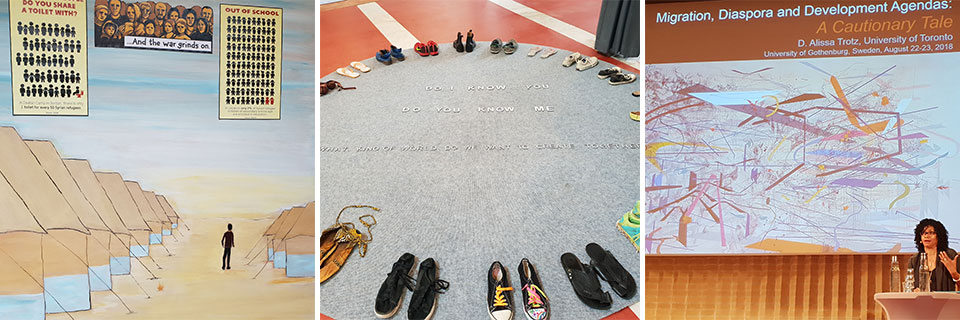
DevRes is one of the largest conferences for the field of development research. This year’s DevRes2018 took place over two days on 22 and 23 August 2018 in Gothenburg and was themed around ‘Rethinking Development’. The conference programme covered many current issues such as diasporas, digitization, food security, religion, intellectual property, and health surveillance. Close to 400 international academics, policy makers and practitioners took part, including many participants from the Global South.
Twenty years after the publication of a special issue devoted to this very question, similar concerns prevail: the prevalence of language, theory and methods rooted in Global North academic knowledge production, legacies of structural adjustment and failed projects, and aid flows that still represent global inequities of resource distribution. Adding to the need to ‘rethink’ development studies and practice are the intensifying risks of climate change (and a global apparatus responding to it in ways that obscure grounded realities), the appropriation of development discourse by far-right regimes, and the displacement of people in ways that have long looked more like de-development.
Alissa Trotz, associate professor in Carribean Studies and Women and Gender Studies at University of Toronto, was one of the two keynote speakers, the other being Mistra Urban Futures Director David Simon.
Alissa Trotz’s keynote challenged the centrality of aid, arguing that migrants’ remittances have become retooled as aid alternative, serving the interests of a neoliberal governmental order. She argued for the need to problematise how migrants become positioned as resources for development in their home countries; diasporic communities are mobilised are used by states or other actors to fill a function for development.
David Simon’s keynote suggested shifting from anti-development to post-development, requiring the search for alternatives as well as critique. These, he suggested, include pluriversal perspectives; local cosmologies, hybrid modernities and synchretic sensitivities in a world of contested, polarising politics of truth.
The global challenges require a rethinking also concerning development research. Many current issues were raised during the conference, such as digitalisation, food security, health and immaterial rights.
Mistra Urban Futures’ comparative project on Food Chains arranged one of the many parallel sessions at DevRes2018: ‘We are what we eat: comparative perspectives on urban food supply, security and value chains’. A panel of project team members from Gothenburg, Kisumu, Cape Town and Sheffield discussed different food system change viewpoints, in a session chaired by David Simon and Stephen Agong, platform director in Kisumu.
‘Global development issues demand collaboration and exchange between researchers from different disciplines but also between researchers and practitioners in different parts of the world’, concluded Isabell Schierenbeck, Professor at Global Studies and chair of Centre for Global Migration, which arranged DevRes2018.
Further information: please contact David Simon, Director, Mistra Urban Futures
See also interview with Alissa Trotz at Global Studies' website
Text by Linda Genborg, Charlie Spring and Jan Riise
Photos by Linda Genborg